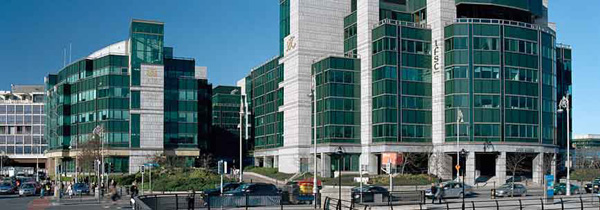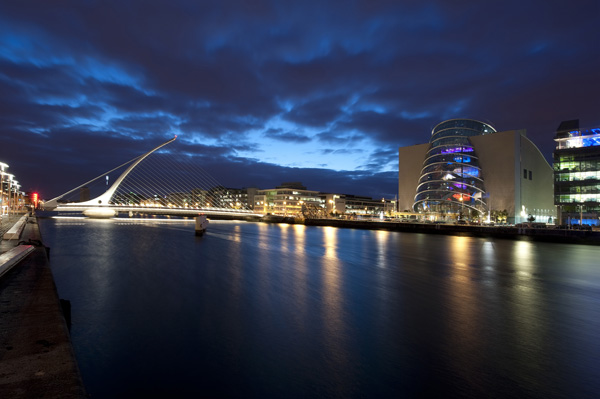About the IFSC
This year the IFSC celebrates it's 35th year as one of the world's leading financial services centres. The importance of the International Financial Services Centre to the Irish economy is indisputable. It has become one of the leading hedge fund service centres in Europe, and many of the world's most important financial institutions have a presence here.
There has been dramatic changes in the composition of the international financial services industry with a shift in employment patterns, a loss in banking jobs but gains in fund administration, insurance, aircraft leasing and payments. Total employment in the IFSC stands at over 38,000 with 10,000 people employed outside Dublin and pay over €1 billion in corporate taxes each year, with a further €1 billion going to the exchequer in payroll taxes.
Employment growth has been driven by technology focused roles, and has reflected Ireland’s ability to combine financial services and ICT strengths. IFSC companies now account for about 38 per cent of all financial services corporation tax revenues
Tax take at Ireland’s international financial services companies:
2015: €621.4 million
2014: €545 million
2013: €497 million
2012: €456 million
2010: €625 million
2009: €642 million
Source: Revenue Commissioners

Contact us today if your Company is looking to locate to the IFSC.
Background
Dublin's IFSC, which was set up by the Irish Government with EU approval in 1987, is globally recognised as a leading location for a range of internationally traded financial services, including banking, asset financing, fund management, corporate treasury management, investment management, custody and administration and specialised insurance operations.

More than 500 operations were approved to trade in under the IFSC programme. The centre is host to half of the world's top 50 banks and to half of the top 20 insurance companies. Merrill Lynch, Sumitomo Bank, ABN Amro, Citibank, AIG, JP Morgan (Chase), Commerzbank,BNP Paribas and EMRO are just some of the big-name operations that have chosen to locate in the area. A sophisticated support network, including shared services centres, software development, and legal and accountancy companies, has also developed around the IFSC.
The IFSC was established in 1987 under legislation designed to boost activity and employment in the Irish economy. The Government had identified the growth potential of the international financial services sector and recognised that Ireland had the capacity to develop in the industry because of its well developed financial infrastructure, a sophisticated internal and international communications system and a young and highly educated population.
The Finance Act, 1986, introduced financial incentives to encourage urban renewal and investment by the private sector. The Finance Act 1987 established a special 10 percent corporation tax rate for certified companies setting up in the IFSC. From the end of 2002, this 10 percent rate ceased to apply to financial services companies, except for those operations that set up before before July 1998, which continued until the end of 2005. All other operations are now subject to the standard corporation tax rate of 12.5 percent on trading income.
The IFSC was constructed in two phases. Phase one began in 1988 and started with the construction of The International Centre, IFSC House and La Touche House – three statement buildings which announced the arrival of Dublin as an international financial services hub. In total, 1.3 million square feet of office space was constructed during phase one which extended as far as Common Street when completed. Phase two increased the office footprint of the IFSC by a further 2 million sq ft and was concluded with the opening of Guild House in 2000, by which time the IFSC was home to 14,000 workers.

Since the 1st January 2006, companies in the IFSC in Dublin pay tax at the normal corporation tax rate of 12.5 per cent. The special IFSC rate ended in accordance with agreements between Ireland and the EU on state aid rules. The 12.5 per cent is still below the corporation tax rate of many of Ireland's European competitors; although several new EU countries from eastern and central Europe have also slashed their corporation tax rates to emulate Ireland's achievements in attracting foreign direct investment.
Today, the IFSC economic activities now involve the export of internationally traded financial services. The IFSC also covers established support networks including legal and accountancy, financial software development, shared services and outsourcing service providers.
-
500+ firms
-
Average salary of €60,100
-
Total Direct Employment of over 38,000+
-
Indigenous firms employ almost 6,000
-
Firms operate from more than 20 different counties throughout Ireland
-
Accounts for 10% of multi-national employment in Ireland
-
Contributes 7.4% of Irish GDP
-
Contributes approximately €2.1bn to the Irish Exchequer
Site Development
The initial designated site of the IFSC was 11 hectares of land in the Custom House Docks area of the Dublin's City Centre. This area was one of the largest blocks of prime urban land in the city to be designated for redevelopment. The Customs House Docks Development Authority was established to redevelop the area. Construction started in late 1988 and the first building, the Western Block, was completed and occupied by Allied Irish Banks in 1990.
In May 1997, the Custom House Docks Development was dissolved. At this stage, the IFSC had 114,000 sq m of office accommodation, as well as 333 apartments, a hotel, multi-storey car park and retail space, including a pub, restaurants and the Dublin Exchange Facility. This area is now known as IFSC I.
The Dublin Docklands Development Authority was established in 1997. Its main functions are to continue to develop the original Custom House Docks Area (IFSC I); to develop IFSC II, and to facilitate the development of the Docklands North Lotts area.

A further 4.8 hectares of land has been redeveloped to provide IFSC II, which includes 70,000 sq m of new office space. The overall area is now 15.8 hectares and accommodates over 184,000 sq m of office space, as well as two hotels, bars and restaurants, a large residential development, retail, a crèche and the €100m National College of Ireland campus, which was officially opened in April 2003.
Irish Government sees the IFSC as a driving force behind the physical rejuvenation of the north inner city, and believes that the successful development of the Custom House Docks Area has provided the foundation for the ongoing development of the wider Docklands Area.
Approval and Certification of IFSC Companies
Up until the end of 1999, companies wishing to commence trading in the IFSC at the 10 percent corporation tax rate had to secure both taxation certification and approval from the relevant authorities. The system of approval and certification has now come to an end for both standalone and agency managed companies.
Applications to establish a presence in the IFSC at the time were initially dealt with by the IDA's financial services division. Companies would then have to seek approval to operate under the 10 percent corporation tax regime from the Certification Advisory Committee (CAC). The CAC was made up of representatives from the IDA, the Department of Finance, the Department of Enterprise and Employment and the Central Bank. The main issues for consideration included:
-
the reputation, experience and financial strength of the promoting company
-
the proposed activities
-
the expected contribution to the IFSC's development.
Getting to the IFSC
The IFSC is served by the 15a, 15b 90, 142, 151 bus services.
DART
Connolly Station and Tara Street Station are within five minutes walk of the IFSC & Docklands. At peak times, the DART runs every 10 minutes.
LUAS
The IFSC & Docklands area is also accessible by the city's commuter light rail system, the Luas. The nearest Luas stop is at Connolly Station.
Parking